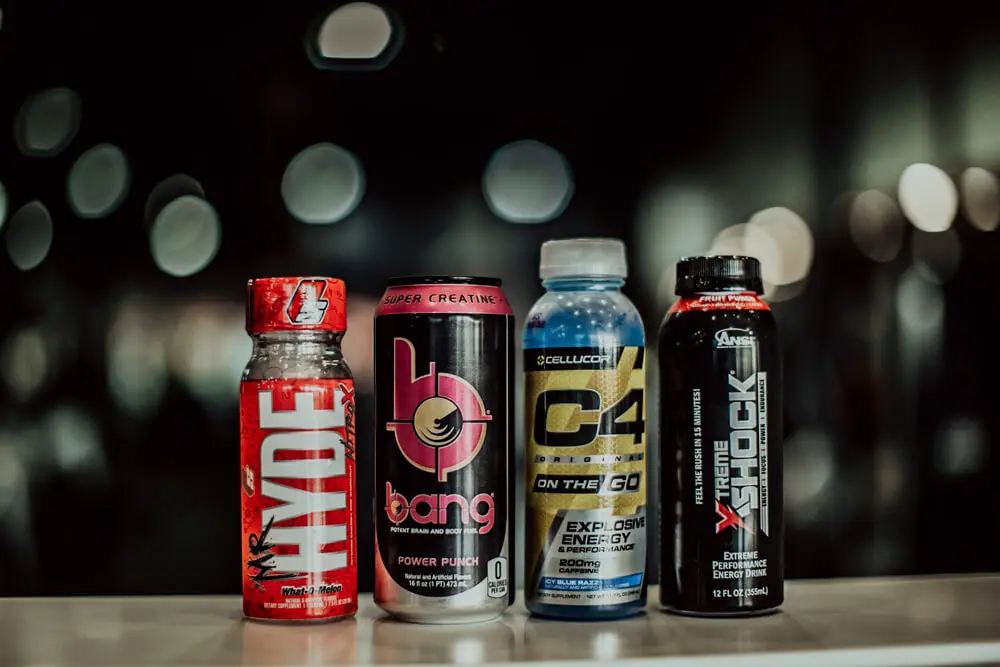What Is Pre-Workout Supplementation?
Pre-workout supplementation involves consuming specialized dietary formulas designed to enhance exercise performance, energy levels, and muscle endurance. These supplements contain specific combinations of active ingredients taken 30 minutes before training to optimize workout results.
Common Types of Pre-Workout Products
Pre-workout supplements come in several forms:
- Powder Formulas: Mix with water for quick absorption
- Ready-to-Drink Solutions: Pre-mixed liquid supplements
- Capsules: Concentrated doses in pill form
- Bars: Solid supplement bars with extended release
Key Active Ingredients
Pre-workout supplements contain specific performance-enhancing compounds:
Primary Components:
- Caffeine (150-300mg): Increases energy, focus, and alertness
- Beta-Alanine (2-5g): Reduces muscle fatigue during exercise
- Creatine (3-5g): Enhances muscle power and strength
- Citrulline (6-8g): Improves blood flow and muscle pumps
- BCAAs (5-10g): Support muscle recovery and reduce fatigue
Ingredient Effects Table:
| Ingredient | Primary Benefit | Typical Dosage |
|---|---|---|
| Caffeine | Energy & Focus | 150-300mg |
| Beta-Alanine | Muscle Endurance | 2-5g |
| Creatine | Power Output | 3-5g |
| Citrulline | Blood Flow | 6-8g |
| BCAAs | Recovery | 5-10g |
- Strength-focused blends emphasize creatine and beta-alanine
- Endurance formulas prioritize caffeine and amino acids
- Recovery-based options concentrate on BCAAs and citrulline
Benefits of Taking Pre-Workout
Pre-workout supplements enhance exercise performance through specific ingredient combinations that target energy production, muscle endurance, and mental focus. Studies indicate these supplements improve workout efficiency when taken 30-60 minutes before exercise.
Enhanced Exercise Performance
Pre-workout supplements increase blood flow to muscles, optimizing nutrient delivery during exercise. The combination of citrulline and beta-alanine reduces muscle fatigue, enabling longer training sessions at higher intensities. Research shows these ingredients improve:
- Muscular endurance in compound lifts
- Power output during resistance training
- Training volume capacity
- Nutrient delivery to working muscles
- Recovery between exercise sets
| Performance Metric | Average Improvement |
|---|---|
| Strength Output | 8-13% increase |
| Training Volume | 15-20% higher |
| Exercise Duration | 12-18% longer |
Increased Energy and Focus
The caffeine content in pre-workout supplements delivers cognitive enhancement and sustained energy throughout training sessions. Key benefits include:
- Enhanced mental alertness during workouts
- Improved reaction time in complex movements
- Sustained energy levels for 2-3 hour sessions
- Better mind-muscle connection
- Increased motivation for high-intensity training
| Energy Component | Duration of Effect |
|---|---|
| Mental Focus | 4-6 hours |
| Physical Energy | 2-3 hours |
| Peak Performance | 1-2 hours |
Research demonstrates pre-workout ingredients like caffeine boost alertness while creatine enhances power production capacity. Beta-alanine reduces acidic buildup in muscles, extending performance duration during intense training periods.
How to Take Pre-Workout Effectively
Pre-workout supplementation requires specific timing and dosage protocols to maximize its effectiveness. The method of consumption directly impacts the supplement’s performance-enhancing benefits.
Proper Timing and Dosage
Pre-workout supplements reach peak effectiveness when taken 30-60 minutes before exercise. Here’s the optimal approach:
- Base Dosage: Mix 1 scoop (5-10g) of powder with 8-12 oz of water
- Caffeine Content: Consume 150-300mg caffeine based on tolerance level
- Beta-Alanine: Take 2-5g for optimal muscle endurance benefits
- Creatine: Include 3-5g to enhance power output
- Timing Windows:
- Morning workouts: Take immediately after waking
- Afternoon sessions: Take between meals
- Evening training: Take 3-4 hours before bedtime
Natural Food Alternatives
Natural alternatives provide similar benefits without synthetic ingredients:
- Energy Sources:
- Black coffee (95mg caffeine per 8 oz)
- Green tea (28mg caffeine per 8 oz)
- Banana (25g carbohydrates)
- Performance Boosters:
- Greek yogurt with berries
- Whole grain toast with peanut butter
| Natural Alternative | Key Nutrient | Amount per Serving |
|---|---|---|
| Black Coffee | Caffeine | 95mg/8 oz |
| Banana | Carbohydrates | 25g |
| Green Tea | Caffeine | 28mg/8 oz |
| Greek Yogurt | Protein | 15g/5.3 oz |
Important Safety Considerations
Pre-workout supplements require careful attention to safety protocols due to their potent ingredients and potential effects on the body. Understanding these considerations helps minimize risks and optimize benefits.
Potential Side Effects
Pre-workout supplements can cause several physical reactions:
- Digestive Issues: Abdominal cramps diarrhea nausea
- Sleep Disruption: Insomnia when taken too close to bedtime
- Cardiovascular Effects: Increased heart rate elevated blood pressure
- Physical Discomfort: Headaches dizziness fatigue
- Fluid Balance: Temporary weight gain from water retention
- Skin Reactions: Tingling sensations from beta-alanine
Who Should Avoid Pre-Workout
These individuals should not use pre-workout supplements:
- Adults with specific medical conditions:
- Heart problems
- Thyroid disorders
- Parkinson’s disease
- Cancer patients receiving treatment
- People taking medications that interact with:
- Caffeine
- Performance enhancers
- Stimulants
Pre-workout safety data table:
| Component | Safe Daily Limit | Risk Level |
|---|---|---|
| Caffeine | 400mg | Moderate |
| Beta-Alanine | 6g | Low |
| Creatine | 5g | Low |
Start with 50% of the recommended serving size to assess tolerance. Monitor your body’s response for 30-60 minutes after consumption. Stop use if adverse reactions occur.
Conclusion
Pre-workout supplements can be powerful tools to enhance your fitness journey when used correctly. They’re designed to boost your energy focus and performance through carefully selected ingredients like caffeine beta-alanine and creatine.
While these supplements offer notable benefits they’re not mandatory for achieving your fitness goals. You can opt for natural alternatives or focus on proper nutrition and rest. If you choose to use pre-workout supplements remember to follow recommended dosages start slowly and listen to your body’s response.
Your fitness success ultimately depends on consistency dedication and a well-rounded approach to health and wellness. Pre-workout supplements can support your efforts but they work best as part of a comprehensive training strategy.
